Olympic Inspiration
by Graham HaysWhat do 10 players yet to play their first match have in common with 2024 Olympian Avery Skinner? A tall guy who believes in them.
NASHVILLE, Tenn. — Former Kentucky volleyball All-American Avery Skinner called Anders Nelson this past spring with a question: If she made the United States team, would her former coach and mentor join her friends and family delegation at the Olympics in Paris?
Answering didn’t require great deliberation.
 Nelson could hardly have declined—not after helping set Skinner on the path to Paris in the first place. Along with longtime Kentucky head coach Craig Skinner (no relation to Avery), who also made the trip to Paris, Nelson invested countless on-court hours helping the athlete hone the skills necessary to compete at the highest level. But the minutes he invested in a coffee shop meetup long after Skinner played her final game for the Wildcats may have been just as influential.
Nelson could hardly have declined—not after helping set Skinner on the path to Paris in the first place. Along with longtime Kentucky head coach Craig Skinner (no relation to Avery), who also made the trip to Paris, Nelson invested countless on-court hours helping the athlete hone the skills necessary to compete at the highest level. But the minutes he invested in a coffee shop meetup long after Skinner played her final game for the Wildcats may have been just as influential.
Catching up in 2022 before Skinner headed overseas to debut professionally, Nelson asked what she wanted from the experience. She spoke of seeing the world and having fun. Those were valid goals, he recalled, but they also didn’t sound entirely convincing coming from the person he knew.
“Avery, you’re not thinking even close to big enough. You can be an Olympian,” Nelson told her. “I remember her being a little taken aback. But one of the things that sets Avery apart is she has this determination. When she decides that she wants to go after something, there’s a twinkle in her eye. Even that day, I could see she was going to go after this.
“I wanted to make sure that she understood what she was capable of.”
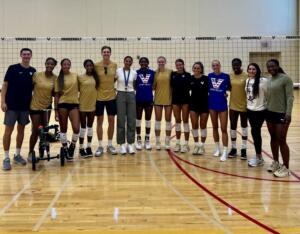 She returned the favor soon after arriving home this summer with a silver medal—visiting Nashville and sharing her Olympic experience with the Vanderbilt student-athletes who are helping Nelson build a program. Skinner wanted the six first-year and four transfer student-athletes to understand what was possible with Nelson as their guide.
She returned the favor soon after arriving home this summer with a silver medal—visiting Nashville and sharing her Olympic experience with the Vanderbilt student-athletes who are helping Nelson build a program. Skinner wanted the six first-year and four transfer student-athletes to understand what was possible with Nelson as their guide.
The Commodores are a long way from the SEC and NCAA championships that sit atop the program’s pyramid of goals, let alone from celebrating homegrown Olympians. But as Nelson and his coaching staff sit down with student-athletes for individual meetings this fall, the conversations will in many ways resemble that Lexington coffee shop encounter. And also, perhaps, the conversations Nelson has had with countless other student-athletes over the years, about earning a starting role, playing professionally, pursuing medical school, being a better friend and other subjects that fall under the all-encompassing umbrella of coaching.
Nelson calls it “shattering your ceiling”—a sentiment shared by Vanderbilt’s motto: dare to grow. It’s what Vanderbilt volleyball has to offer right now: not markers of past glory hanging in the rafters, but the potential of what’s possible with a coach committed to growth. As Skinner learned, that’s enough to take you places—even the Olympics with the world watching. For the Commodores, the first steps come now in an empty gym in Nashville.
“So many people come to see him,” said first-year outside hitter Reese Animashaun. “That speaks volumes about who he is as a coach and a person. He has so many connections with all of these people—not even just these hugely successful athletes like Avery, but all these people who played for him or worked with him. He’s touched them in some way. So, you have to believe what he’s saying because he has so many people who will speak for him. I’ve never met someone who’s been like, ‘Yeah, I didn’t really vibe with Anders.’
“When he speaks to me about what I can be and where the coaches see me going, with the passion he has, it’s so easy to believe I can do it.”
An Olympian’s First Steps
Skinner arrived at Kentucky as a happy-go-lucky spirit, in Nelson’s words, ready to hit the ball as hard as she could and go from there. She remembers a preseason meeting that first year in which coaches asked her about her goals for the year ahead and her time in Lexington. Hesitantly, almost with a question mark at the end of the thought, she said something about earning All-SEC honors before she was done. Nelson and Craig Skinner told her she needed to think bigger—that she was capable of much more than that.
She wasn’t sure she could envision the world her coaches described. She was a new arrival on a senior-laden team and still adjusting to playing outside hitter. But she was intrigued.
“Of course I wanted to be successful, I wanted to play,” Skinner recalled. “But I didn’t even know what I could be dreaming of, to be honest. And that is something that they helped open my eyes to.”
Sure enough, she earned SEC All-Freshman honors. Still, good vibes and encouragement aren’t enough to make someone an Olympian. Skinner’s story wasn’t a fairy tale: She lost her grasp on playing time for parts of her sophomore and junior seasons. As a high school and club standout, like everyone who makes it to the SEC, being on the team and on the court had been synonymous. Now, she struggled to adapt to a role on the bench—and to coaches who were still holding her to high work standards without rewarding her with playing time.
View this post on Instagram
But the coaches never checked out on her, a reality she appreciated at the time and values even more in hindsight. Nelson always seemed to know when something was on her mind, volleyball or otherwise, and checked in on her. His investment in her was never tied to the returns that were or were not evident on the court in a given moment.
“I knew if I asked him anything, he would give me his true opinion. He wouldn’t sugarcoat it,” Skinner said. “I really appreciated that because, yes, you need the encouragement, but you also need someone being realistic and telling you, ‘Hey, this is where you’re doing great, but also, this where you’re falling short and where you can be better.’
“He’s not calling you out to be mean, but because he cares for you and knows you can do better. He would never ask anything of any player that he didn’t think was possible. I knew he was always going to shoot me straight, whether or not it was hard for me to hear. I needed that at times—and I also needed the encouragement. He just has a way of finding a balance between holding people to a high standard but knowing when grace is needed.”
The volleyball component clicked into place for her as a senior, when she was one of the best players on the team that won the SEC’s first volleyball national championship.
Drawn to speech pathology through a deaf cousin, she had long assumed she would finish volleyball, proceed to graduate school and enter the working world. But when she was granted an additional year of eligibility as a result of the COVID-19 pandemic, she spent a graduate season playing and studying at Baylor. She then pursued the opportunity to play professionally in France, still not ready to walk away from the sport. Still, she told her agent it was probably only for a year.
That was about the time that she met Nelson for coffee, having returned to Lexington for a mutual volleyball friend’s wedding. She didn’t grow up watching Team USA or dreaming of the Olympics. She hadn’t ever thought much about the national team and didn’t know what was involved in being selected—or even getting on the radar. Nelson’s exhortation might not have been the first time anyone brought up the idea in her company, but it was the first time he’d brought it up. Perhaps that’s why it resonated: If he thought she could, then why not?
She went to France and excelled, then to Italy the following season. Two years later, which even Nelson admits was an Olympic cycle earlier than he initially envisioned, she was on the medal stand in Paris.
“Something that is very much a coach’s job, especially if you’re coaching young women, is to get them to understand what they’re truly capable of,” Nelson said of the philosophy behind shattering ceilings. “I’m not a person who’s going to sit here and say you can do anything you want. That’s not how life works. You can’t do everything you want. There has to be a certain ability level, so being realistic about it is important.
“But I’ve also seen the confidence it gives somebody when you believe in them and how it can fuel them.”
Finding Ceilings to Shatter
For the coaches, this fall is the second one to pass without the familiar rhythms and emotional highs and lows of wins and losses. It’s all new, on the other hand, for first-year student-athletes Animashaun, Maddy Bowser, Taryn DeWese, Hailee Mack, Gigi Mason and Rachel Ogunleye and for transfers Isabella Bareford, Sydney Conley, Elli Kinney and Jacquelyn Moore. They are used to fall matches, competing for state and conference championships, getting the instant feedback—and potential validation—of competition.
Other demands will be familiar this fall, from the early morning weightlifting to practice drills and conditioning. But the only matches will be scrimmages, and the only regular competition will be rounded out by practice players from the men’s club team on campus.
“I’m such a competitive person by nature, it’s hard to think about not getting to play games, but the coaches are doing a lot to keep us really invested,” said Mack. “They’re giving us that scrimmage time. And we just like to get after it. I think it’s fun when you get to play your teammates because when you’re on the court, yes, you’re going after each other, but then you go get lunch together and you’re completely chill again.”
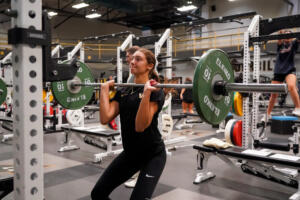
Hailee Mack at work in the weight room this fall (Vanderbilt Athletics).
Mack also knew what she was signing on for with a program building from the ground up. It’s part of what appealed to her about the opportunity in Nashville. She has access to the same levels of facilities and coaching as her peers across the SEC, and she gets to use those resources to improve for a year without sacrificing any eligibility.
Her friends at other schools talk about their heads spinning from trying to compete for playing time while adjusting to college life and academics. And while Mack is not exactly awash in free time, she is free to focus on process rather than results. She stubbornly followed a passion for volleyball despite a natural aptitude for soccer and a childhood immersed in basketball with parents who played and coached. A self-described late bloomer who grew several inches in recent years and emerged as a highly ranked recruit as a libero, she embraces this fall as an opportunity to find out what she is capable of.
“I feel like a lot of teams probably have a phrase they put on the back of their shirt, and they don’t really think twice about it,” Mack said of the “shatter your ceilings” mantra. “But I feel like for us, we’re really living those words. We can build what we want Vanderbilt to be this year and not think about outside expectations. It’s really hard to tune out expectations as an athlete, but because we’re not playing games this year, you have that freedom to take risks to grow. To me, it’s living it every single day and trying to focus on what I can do to get better instead of the mistake I made last play.”
Nor is it solely about what happens on the volleyball court. While the top of the program’s pyramid of goals includes eventually earning championship hardware, the more immediate foundation includes cornerstones like health, social life and school. For Animashaun, this year’s unique circumstances allowed her to push her limits academically. Without weekend travel commitments for volleyball, she’s taking a heavier course load, including particularly demanding chemistry and calculus courses. When she applied, she envisioned following a pre-med track. But a year is a long time in a teenage life, and interests change. Settling in on campus, she’s been free to explore a newfound interest in engineering.
“That idea of ‘shattering your ceilings’ resonates so much on the court, obviously, but for me, it’s a holistic thing,” Animashaun said. “With the classes I’m taking, I kind of went for it. It’s hard, but I think it’s going to be so rewarding. So it’s definitely pushing myself in that aspect. Even just socially, it’s connecting with people, going to things that I wouldn’t usually be interested in, pushing myself in ways that I wouldn’t normally think to, I guess, to network, meet people and grow myself.”
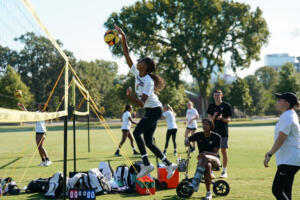
Reese Animashaun and the Commodores took practice to the public in Centennial Park earlier this fall (Vanderbilt Athletics).
A Foundation for Success
Nelson averaged watching more than a match per day to soak in as much volleyball as possible during his brief Parisian adventure—always a “volley-nerd” as Skinner joked. But when Skinner and the American women took the court, he was no longer a coach or tactician. He was just a fan, cheering for a team and proud of a person he had known and cared about for the better part of a decade.
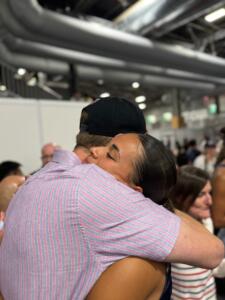 He cared enough to know that she wouldn’t be happy going to Europe to just play a little volleyball, take some scenic photos and eat good food. He believed she could do more.
He cared enough to know that she wouldn’t be happy going to Europe to just play a little volleyball, take some scenic photos and eat good food. He believed she could do more.
“It’s just human nature,” Nelson said. “When someone believes in you and agrees with you that you can achieve a goal, you’re going to work harder. You’re going to have more confidence in what you do.”
Vanderbilt isn’t worried about the 2028 Olympics in Los Angeles just yet. These pioneering Commodores need to get through their first final exams, let alone next fall’s first official match and first SEC season. Just above the base on the program’s pyramid of success, building on the goals of personal growth, are objectives like the first winning season, first all-conference honors and first NCAA Tournament berth. They are goals Nelson believes the first class can reach before they graduate. Those are the first ceilings to shatter, just as Skinner once had to establish herself as a starter before emerging as All-SEC, an All-American and finally Olympian.
“I know that he is willing to give absolutely everything he has to the program and to the girls because he wants to be the best,” said Skinner from Italy, where she recently began another professional season. “His dedication to not just his work, but his people and what he stands for is just so admirable.
“I am excited to see what this program will do with him because, yes, he’s so knowledgeable about the game, but he’s also just a great person. I really loved playing for him, and when you have a coach who you want to play for, it raises the level. You can hold such a high standard because they know that you care.”
This fall is just the beginning. But it never hurts to dream about what might be possible, whether it’s SEC and NCAA championships or the sound of the national anthem playing and the weight of a medal around your neck.
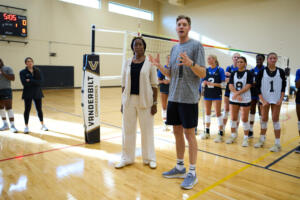 “My huge goal is to go to the Olympics with the USA volleyball team,” Mack said. “That’s definitely the ultimate dream. But I know that’s a long way off, and there are a lot of things out of my control with that.
“My huge goal is to go to the Olympics with the USA volleyball team,” Mack said. “That’s definitely the ultimate dream. But I know that’s a long way off, and there are a lot of things out of my control with that.
“I just know if I play my game, keep working hard, good things are going to happen. Even if the Olympics doesn’t happen, I want to walk away knowing that I did everything I could.”
Nelson can’t guarantee anyone the Olympics, his trip to Paris notwithstanding. But helping people unlock every ounce of their potential? At Vanderbilt, that journey is underway.

